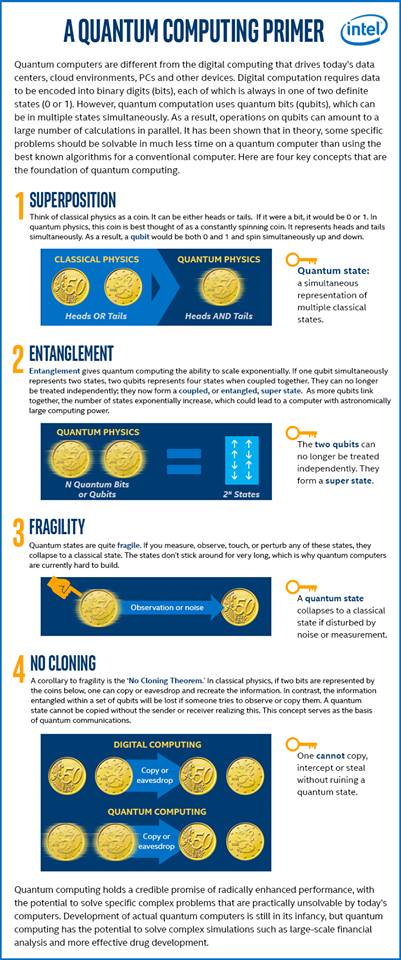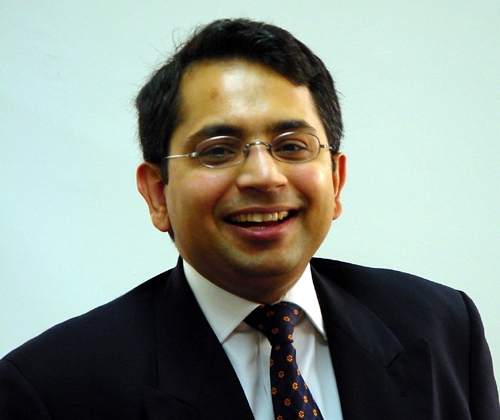Gold Rush Begins: Why Is Intel Investing $50 Million In Quantum Computing?
London, UK - 4th September 2015, 08:20 GMT
Intel has just announced plans to invest USD 50 million over the next 10 years as part of a quantum computing push, to help solve problems including “large-scale financial analysis and more effective drug development.” Intel is joining the gold rush into Quantum Computing after Amazon, Google, IBM and Microsoft alongside government agencies like the NSA and CIA have made similar declarations. The UK and Netherlands government have also made massive pledges to Quantum Technologies 2.0 in the recent period.
 Quantum Computing Primer
Quantum Computing Primer
This is part of a 10-year collaborative relationship with the Delft University of Technology and TNO, the Dutch Organisation for Applied Research, to accelerate advancements in quantum computing. To achieve this goal, Intel will not only invest an eight figure sum, it will provide significant engineering resources both on-site and at Intel, as well as technical support. Intel's goal is to extend the university's physics expertise and diverse quantum computing research efforts by contributing advanced manufacturing, electronics and architectural expertise.
In accord with Quantum Innovations Labs http://QiLabs.net/ findings in London, Intel believes “no one company or organisation will succeed alone in unlocking the path to advanced quantum computing. Instead, partnerships… and industry collaboration will help realize the promise of such a technically complex issue.”
Quantum computing holds the promise of solving complex problems that are practically insurmountable today, including intricate simulations such as large-scale financial analysis and more effective drug development. Quantum computing is an area of research that Intel has been exploring because it has the potential to augment the capabilities of tomorrow's high performance computers.
"Expertise in specialised electronics combined with advanced physics is required to move quantum computing closer to being a reality," said Mike Mayberry, Intel vice president and managing director of Intel Labs. "While qubit development has been the focus of quantum computing research to date, low-temperature electronics will be required to connect, control and measure multiple qubits, and this is where we can contribute. Our collaboration with QuTech will explore quantum computing breakthroughs that could influence the industry overall."
Intel CEO Brian Krzanich published a blog today explaining the company's strategic interest in quantum computing, and the relevance of electronics and manufacturing expertise in making quantum computing a reality.
Read more: http://www.intel.com/newsroom/archive/promise_of_quantum_computing.pdf
"In the next five to 10 years, progress in quantum computing will increasingly require the combination of excellent science with high-level engineering," said lead scientist Lieven Vandersypen from QuTech. "For the realisation of complex circuits containing large numbers of quantum bits, the know-how from the semiconductor industry is essential, and QuTech is thrilled to partner with the leading semiconductor company in the world.
[STOPS]
Source: QiLabs.net 1. Funding Form 2. Involvement Form 3. iQ:Ei Club
What are your thoughts, observations and views? We are keen to listen and to learn.
Best wishes

D K Matai
ATCA: The Asymmetric Threats
Contingency Alliance is a philanthropic expert initiative founded
in 2001 to resolve complex global challenges through collective
Socratic dialogue and joint executive action to build a wisdom
based global economy. Adhering to the doctrine of non-violence,
ATCA addresses asymmetric threats and social opportunities arising
from climate chaos and the environment; radical poverty and microfinance;
geo-politics and energy; organised crime & extremism; advanced
technologies -- bio, info, nano, robo & AI; demographic skews
and resource shortages; pandemics; financial systems and systemic
risk; as well as transhumanism and ethics. Present membership
of ATCA is by invitation only and has over 5,000 distinguished
members from over 120 countries: including 1,000 Parliamentarians;
1,500 Chairmen and CEOs of corporations; 1,000 Heads of NGOs;
750 Directors at Academic Centres of Excellence; 500 Inventors
and Original thinkers; as well as 250 Editors-in-Chief of major
media.
The Philanthropia, founded in 2005, brings together over
1,000 leading individual and private philanthropists, family offices,
foundations, private banks, non-governmental organisations and
specialist advisors to address complex global challenges such
as countering climate chaos, reducing radical poverty and developing
global leadership for the younger generation through the appliance
of science and technology, leveraging acumen and finance, as well
as encouraging collaboration with a strong commitment to ethics.
Philanthropia emphasises multi-faith spiritual values: introspection,
healthy living and ecology. Philanthropia Targets: Countering
climate chaos and carbon neutrality; Eliminating radical poverty
-- through micro-credit schemes, empowerment of women and more
responsible capitalism; Leadership for the Younger Generation;
and Corporate and social responsibility.

